Queenie Cast and Author Talk Book Differences and the Need for Black Women to Fall Apart On-Screen
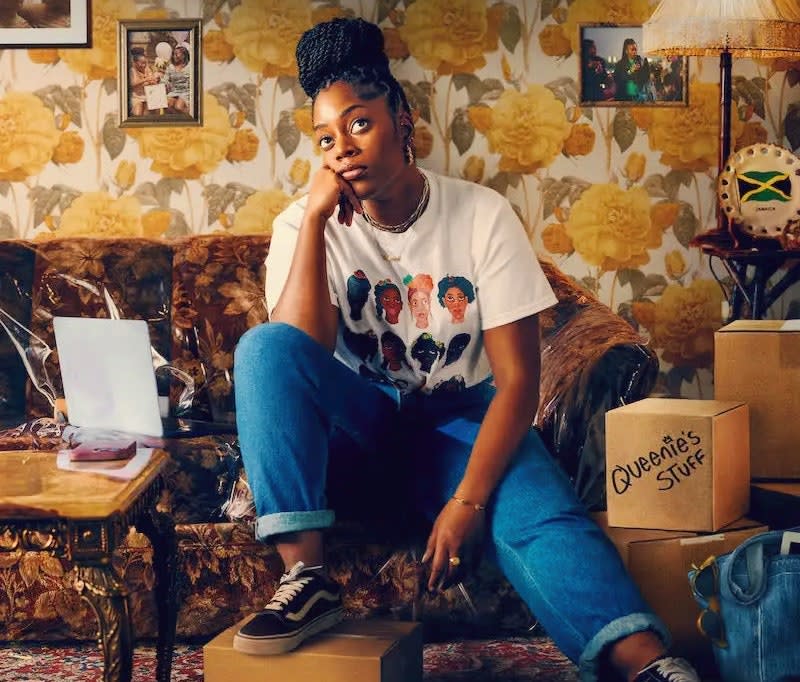
Courtesy of Hulu
In 2019, Candice Carty-Williams's Queenie took the world by storm. The new adult novel was revolutionary in more ways than one — it was a story about coming-of-age, generational trauma, mental health, cultural stigma, everyday racism, consent and sexual agency, all with a first-generation Black Jamaican woman at its center. Now, Queenie is arriving to screens in a deeply nuanced and clever television adaptation, giving new life and vibrant color to the twentysomething canon as one of the summer's most promising dramedies.
Queenie the novel was lauded as Americanah meets Bridget Jones’ Diary upon its publishing; Queenie the television series is led by rising star Dionne Brown, BAFTA-nominated actor Samuel Adewunmi, and singer-songwriter Bellah in her on-screen debut. The eight-episode first season follows protagonist Queenie Jenkins, a 25-year-old Jamaican British woman living in South London who must rebuild her life after a disastrous breakup with her long-term boyfriend. Queenie seeks comfort in all the wrong places and attempts to run from her past, but she soon learns that the only way out of her misery is through it, head-on.
Carty-Williams, who serves as the showrunner and co-executive producer on the series, was the first Black author ever to win the prestigious Book of the Year title for Queenie at the 2020 British Book Awards. The South London native has spoken at length about the complicated nature of the win, an honor that she says exposed a glaring imbalance of equality in the publishing industry. As Queenie Jenkins lives on, from page to screen, Carty-Williams is vigilant and hopeful about the future of storytelling around Black lived experiences. “I'm looking forward to a time that we can have more of this, and this isn't such a central show, or central book,” she tells Teen Vogue.
Today, June 7, Queenie is here to disrupt the coming-of-age genre. Even though there is a heartwarming Bridget Jones' Diary easter egg in the casting of Sally Phillips, Queenie Jenkins is not this generation's Bridget Jones. She is something more. During an uncharacteristically sunny week in London, a group of creatives were immersed into the world of Queenie courtesy of Hulu’s Onyx Collective, touring Brixton and Peckham and sitting down with the cast and creator of the show. Below, read Teen Vogue's conversation with Carty-Williams, Dionne Brown, and Bellah:
Teen Vogue: Candice, you’ve written Queenie to life twice now. Was writing a character who goes through so much taxing on your own emotions?
Candice Carty-Williams: Yes. I'm a really emotional writer, so whatever I'm writing, I'm feeling at the time. I guess like with method acting, you have to jump in. I've always understood that I'd like to be as authentic as possible, and I don't think you can be authentic without feeling it yourself. So I would always put myself in Queenie's shoes, in her position, in her emotional space. And it's a lot. When I was writing the novel, I was 25 [to] 27, across three years of writing and editing. I wasn't emotionally intelligent enough yet to understand the impact it was having on me. But when I started writing it for TV, it was sometimes writing really dark things over, and over, and over. You're like, "Whoa." But then [an actor] takes it on, and then you're like, "Oh, okay, fine. Out of my system."
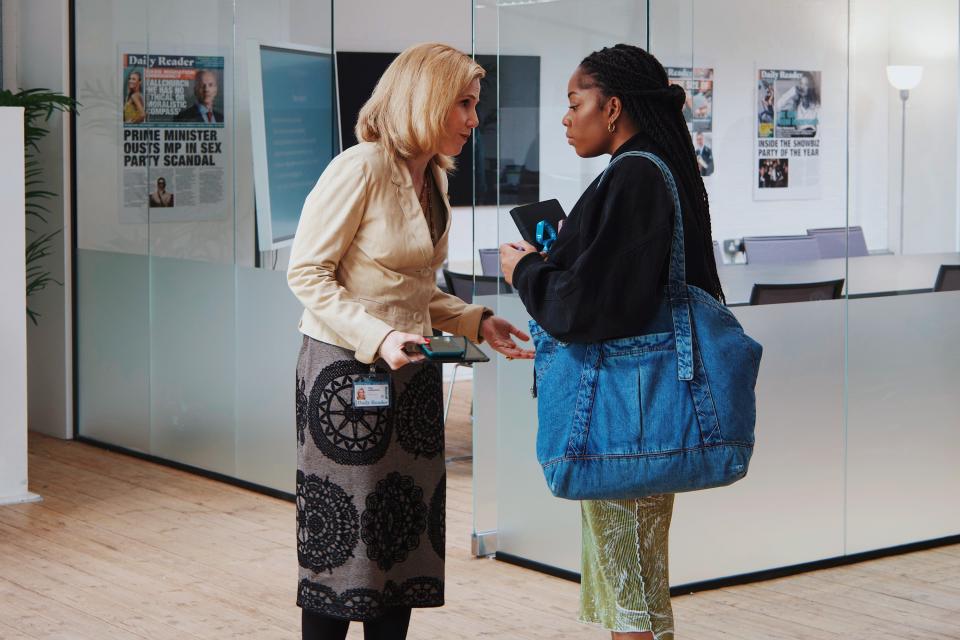
Clean Break Queenie
TV: What about Book Queenie did you feel was most important to preserve when adapting this character for the screen?
CCW: The world and her family. She is really important to me, but also everyone around her, her family and her friends, those [are the] people I wanted to conserve. In terms of storylines, we can go where we need to. When I was [first] writing Queenie, it was 2017, 2018, and we're in 2024 now. You have to transpose everything from then until now, so I was okay with changing things and technology, but in terms of people, they all had to be the core that they were in the novel.
TV: Dionne and Bellah, when did you both read the book and what were your initial reactions?
Dionne Brown: I read the book when I was auditioning, throughout the audition process, and whilst I was shooting. I was reading the book all the time.
Bellah: I read the book after I got the role, because I wasn't privy to the [novel's] world. All my reactions actually came from the first couple of days of shooting when I was reading the script, and I was like, “Oh, okay, I need to do some research quickly.”
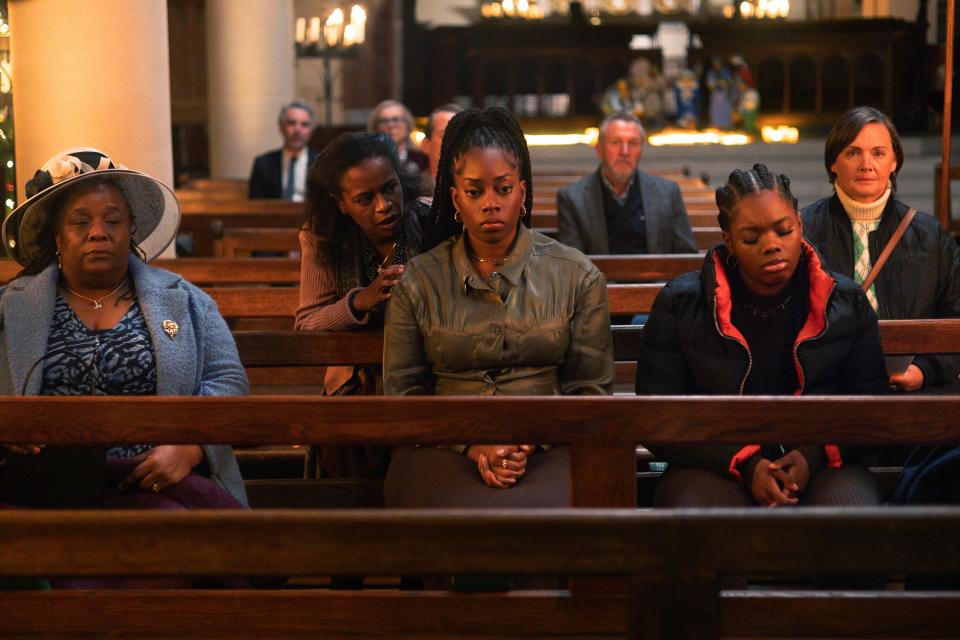
The Nightmare Before Christmas
TV: This is your on-screen debut, Bellah! What was it about this story and about Kyazike that resonated with you and made you want to be involved?
B: I love a laugh. I love understanding that things can be really serious, but you can always laugh about it, and find the funny in it. She's very, very close to me in person. I always say the difference between me and her is heels. She's loving. I offer the comic relief for most of my friends. Life is too serious to be serious all the time.
TV: That's a word. Dionne, are you more like Queenie or Kyazike in real life?
DB: I don't know, maybe somewhere in the middle. More like Queenie, I think, a bit more to myself. I think if we had a commonality, it is our sensitivity. We're obviously just [in] two different places. I'm a little bit older than her.
TV: Frontal lobe developed?
DB: I hope sometimes, yeah!
B: [Laughs] She said, "I hope."
DB: Yeah, we'll find out. But yeah, I think more like Queenie.
TV: Queenie and Kyazike’s friendship is one of the heartbeats of the show. How did you two build a friendship on set?
B: We just got on like a house on fire. And I just feel like if you don't like me, you're bad vibes. Do you know what I mean? And Dionne's not bad vibes. [Laughs] No, during our chemistry read, actually, we had a really good time and we were the last to leave the place, as well. We were kind of looking at each other, [like] maybe we'll see each other... or maybe we won't.
DB: That was a long day, and when we finished, we had to call the respective members on our team. So when we left, we were literally on our phones to give feedback to our agents and our managers, or whatever.
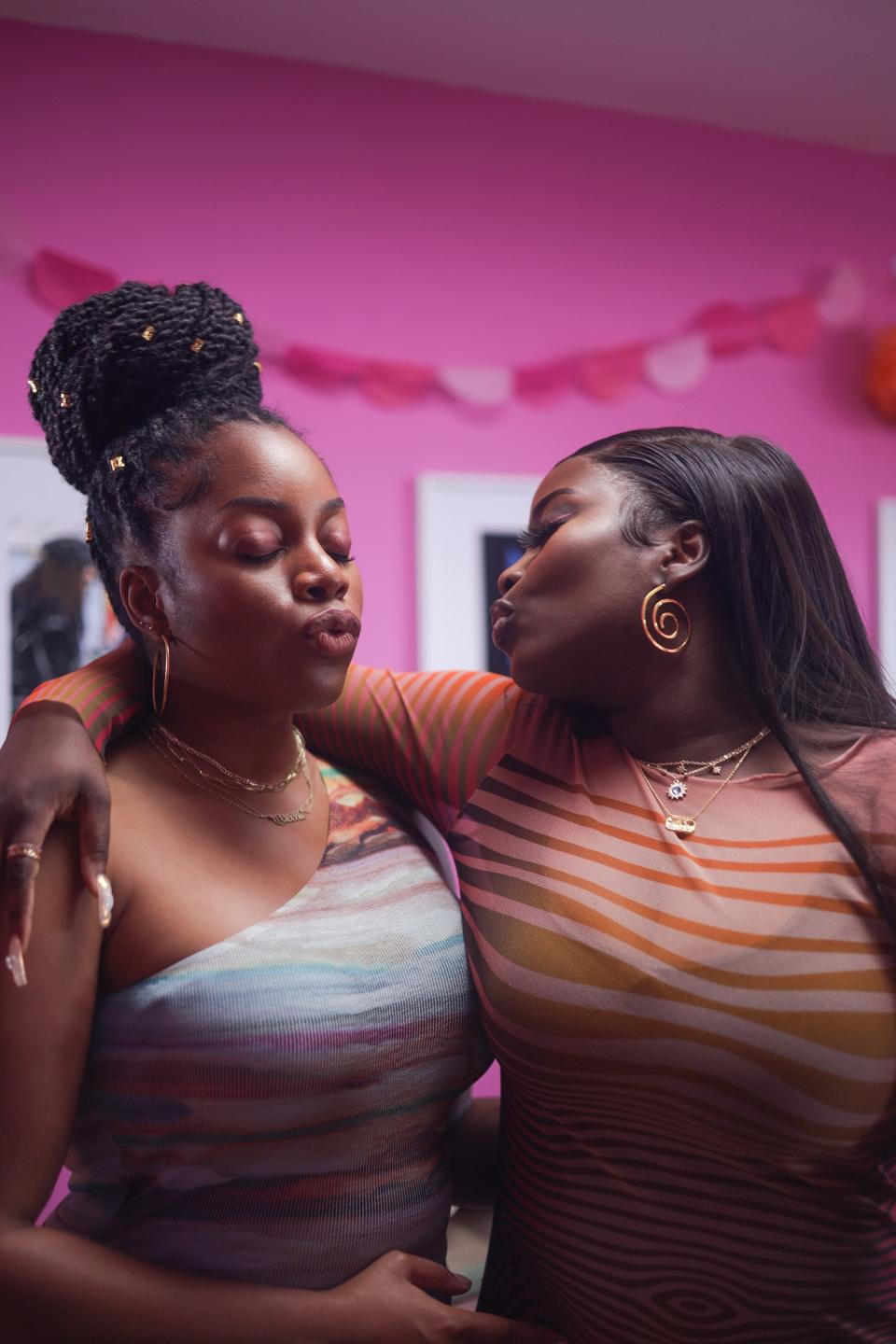
Love, Finally
TV: And you [told them], "I love her."
DB: Well, yeah. It was like, "I'm going to marry her." But no, I remember that day we kept going, "Bye." We just kept [saying] it. I wanted to go up and be like... "So we recorded five times together, how did you find it?" But we couldn't, because it was too late in the evening. And then the next time we saw each other, it was at the table read.
TV: Candice, were you there that day for their chemistry read? What did you pick up on the way that they connected?
CCW: I think I was there from about 9 in the morning till about 7 PM. And we were watching loads of different versions of Queenie and Kyazike and Frank. So it was the three of them together, and Samuel [Adewunmi], who plays Frank, he came in really early so I saw him do Frank maybe 30 times with different people. And by the end I was like, "Oh, he's in the cast." I just knew.
Dionne and Bellah had this really natural way of laughing together, that I was like, “Okay, that's real, and I would believe that on-screen.” Bellah kept making everyone laugh with her ad-libs. And I was like, "If you can do that in this room, she'll do that on set, and that's great." Because you write for screen, you write the script over, and over again. But I think so much of the magic comes when an actor's able to just be the character and make people laugh, or break out of something. And so I was like, "She'll do that." It's great, easy.
TV: As someone of Caribbean descent, I don’t think it can be understated how powerful the authentic depiction of Queenie’s family is. Candice, can I ask what were the priorities for you in casting Queenie’s family? Did you and the other producers intentionally seek out actors of Caribbean descent or those who could slip in and out of patois naturally?
CCW: That's a really good question… I had sort of stalked a couple of members of the cast for a long time. So Michelle Greenidge, she plays Aunty Maggie. I'd seen her in a play called Nine Night, and she'd moved everyone in that audience. And I was like, “That's Aunty Maggie.” So I followed her, and then I just checked where she was, all the time, being like, “So what projects have you got going on?”
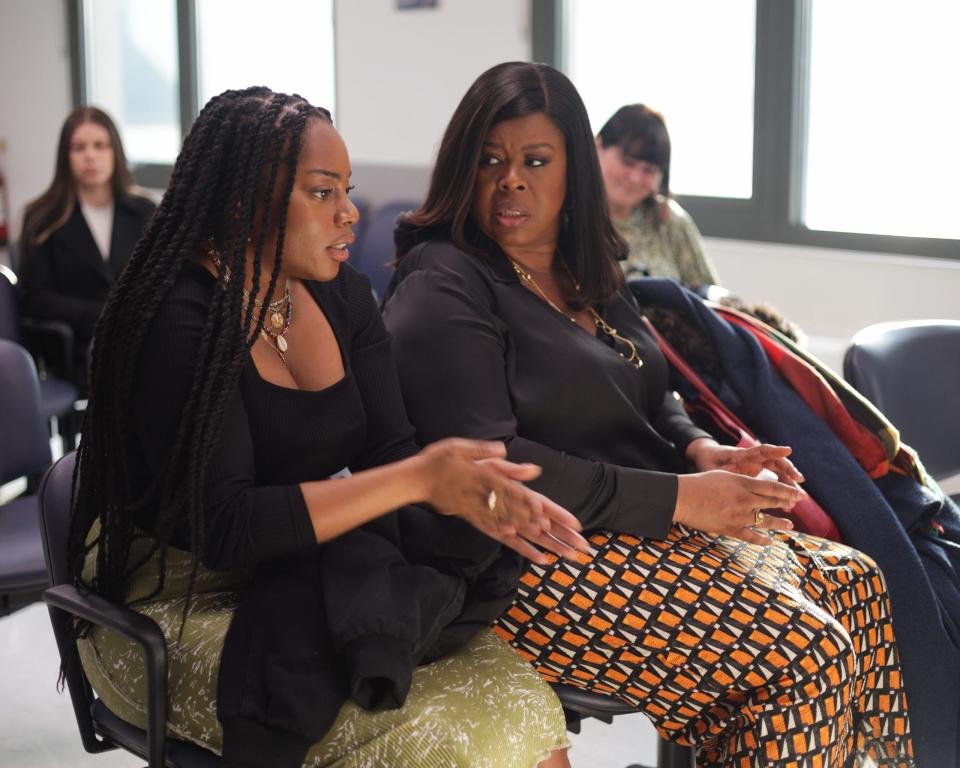
And then Llewella Gideon, who plays Grandma Veronica, I'd also kept an eye on her, and I've been a big fan of her since she was in The Real McCoy, all those years ago… she was amazing, and it was important to me to have a Caribbean family, and a family that looked like and felt like they were a family. Cristale [De'Abreu] is of Jamaican descent, too, so that was helpful for everyone to kind of slip in. And then Joseph Marcell (The Fresh Prince of Bel-Air) who plays Grandad, he is St. Lucian. He is Joseph Marcell, so you don't say no. So that was that. He could have not had an accent, [and] I would've been like, “We'll make it work, it's all right.” [Laughs]
TV: Your cast is truly phenomenal. The power in Joseph, Llewella, and Samuel alone — Bellah and Dionne, as young actresses, was there something your cast mates taught you that you didn’t expect to learn about the craft of acting?
DB: Yes. Literally between all three of them, there's so many things. Joseph, he'd be like, “Just try to be in the moment, darling,” that kind of thing. Llewella, we were always having a chat right before [filming], so I guess it's the connectivity with your scene partner. It's always a conversation. If you're acting opposite someone, you are just having a conversation. We'd always start the day with, “How are you?” She'd ask me what I like to watch on TV, we were always having informative conversations about each other. It didn't feel like we were interrogating each other, but we were just trying to get to know each other, which counted towards our performance, because she's playing my grandmother. It's the connection that [Queenie and Grandma Veronica] have that is so profound.
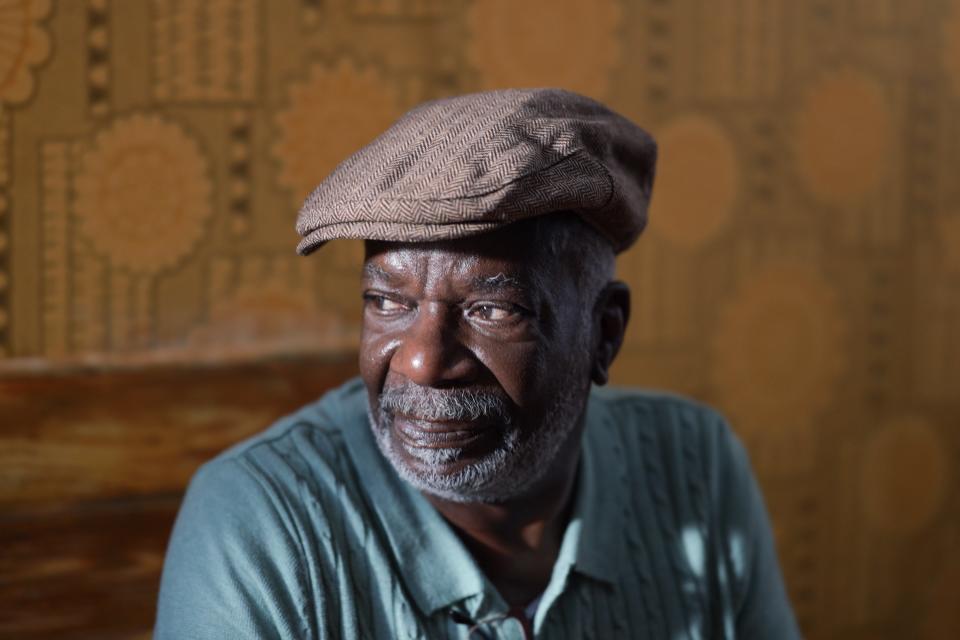
The Nightmare Before Christmas
B: One thing that I learned from everyone, and I found really cool, was how they just disappeared into the role. And that was something that I tried, too. Not that you're not showing up as yourself, but you are melting away into this character. And then you come back when they say cut. It was really nice to see the difference. It could be from us really, really laughing and then going into a serious scene, or someone's not having a great day and then we have to be giggling, but it was really amazing to see all the actors just put it on.
TV: This is such a great acting boot camp for you. What did you learn about yourself in this first role that you're going to take with you to all your future roles? Inevitably, because you are a star on camera.
B: Thank you so much. I've said this a couple of times, but I learnt about just how much I can do and my capability. I knew I was funny, but I'm funnier than I thought. I also learnt that I can do things scared, and still achieve, even if I'm in my head about it. And looking back at it, I'm like, "Oh! No, you ate, chewed it up."
CCW: It's true!
B: I'm going to do more things scared, and I'm going to do more things apprehensive, because it could change my life.
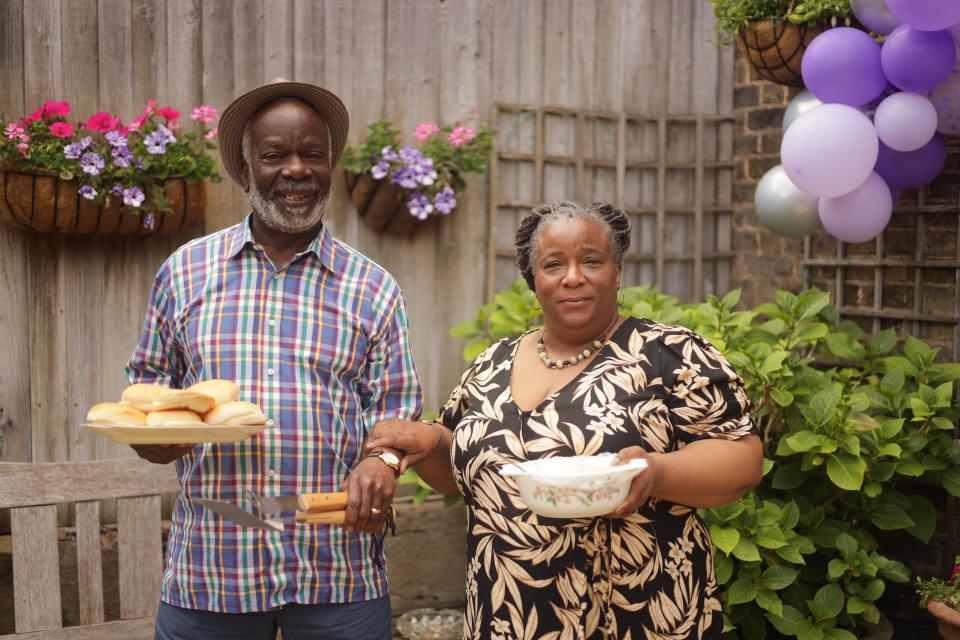
Happy Earthstrong!
TV: So much has changed in the world since the book’s publishing in 2019. It’s notable that there are a few storylines in the show that aren’t as fleshed out as they are in the book, like the #BlackLivesMatter arc, and some that were added, like Queenie and Frank’s arc. Changes are natural in adaptation — and you talked about this a little earlier with letting certain details go. How did you and the creative team intentionally decide which parts of the story to hold focus on?
CCW: I guess the biggest thing is the time that we had. We have 100,000 words in a novel to say what you want to say, and then in a TV show you have 24 minutes, so you're basically always writing to the clock. You're always like, “OK, this is what we can and can't squeeze in.” It was a time constraint. We just have to focus on the things that are going to still tell Queenie's story, and still get to the heart of who she is. Black Lives Matter is of course, a big part of her identity in the book. [But] it was like, "How can we make that work, without doing a full protest in a TV show?" You want to be able to give things the time that they need, and you want to do things well. We filmed this in 48 days, and when you are filming in 48 days and you want to do a protest, it's impossible. It's impossible to do it well. So the biggest thing I learned from being a writer of novels to a TV writer is actually what you can do with time and being really, really thrifty with the minutes that you have, versus so many pages of saying stuff.
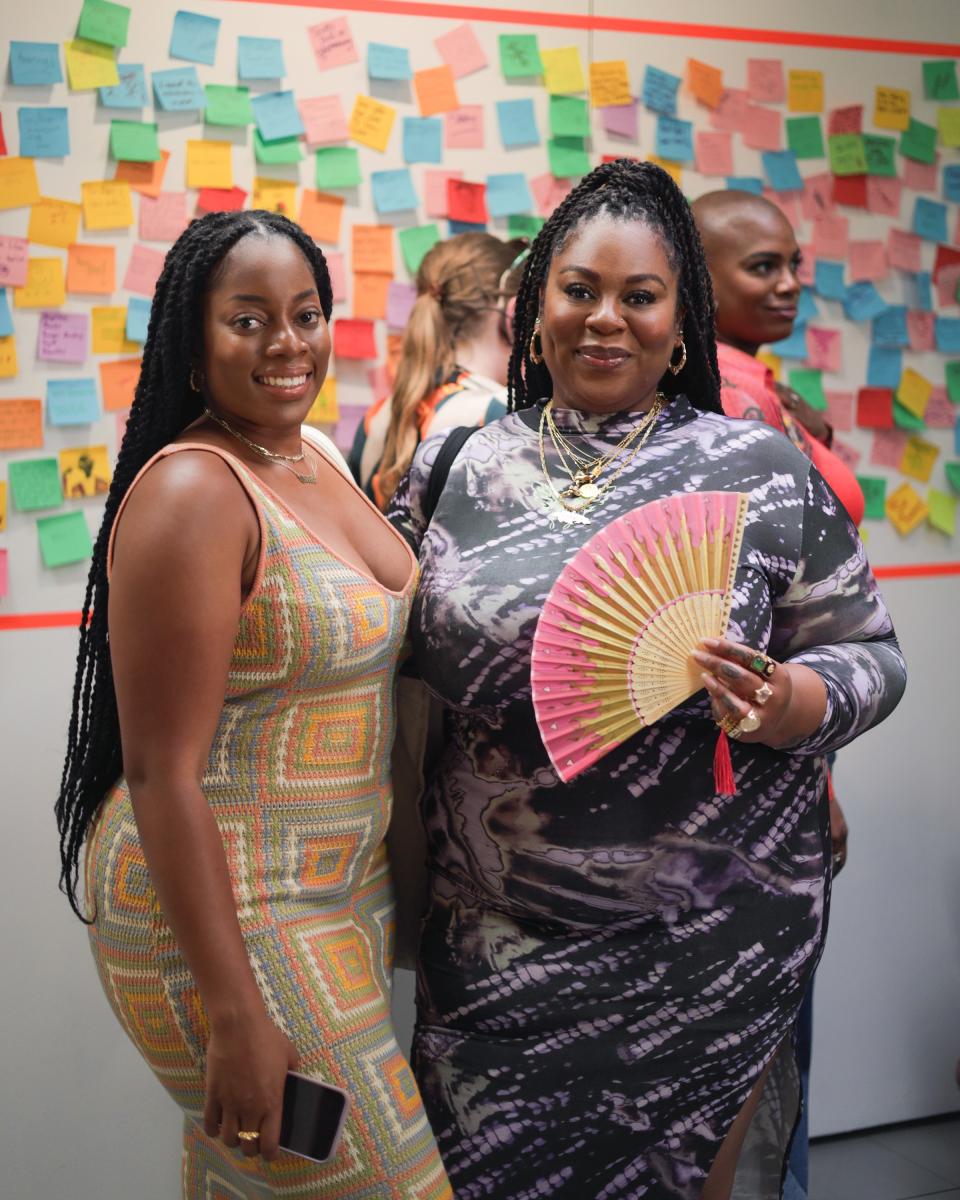
Happy Earthstrong!
TV: You mentioned that pivot you've made towards TV. You've had Champion before Queenie, too. How do all three of you feel about the future of Black British representation on TV? Not just on Channel Four or BBC, but around the globe?
DB: I feel quite hopeful. It feels like an innovative time, I think there's a lot of new writing coming forward… Queenie's not new, but it's adapted for TV, so it's going to feel new-ish visually and in comparison to the book. You have products like Dreaming Whilst Black, or Three Little Birds. We are seeing Black culture at different angles, which I think can only be a positive thing moving forward.
B: It makes me a little bit emotional, because it's really fantastic that our stories are being told. A lot of us are diaspora kids, and so we are the first generation that doesn't have to just focus on survival. A lot of us are chasing our dreams… because our parents, or aunties, or carers, made a decision. The art that we're putting out is being broadcasted globally [and that is] really, really beautiful. I am really, really excited for us, that we have a platform.
CCW: In the U.K., I'm looking forward to a time that we can count the number of shows on more than one hand or two hands. Because at the moment, we're still getting there… I want us to have more than four slots a year. We also have to have very different stories. Queenie [led] the charge as a novel, and then also doing the same thing on TV, being this drama about this Jamaican woman. We need 10 of those, because everyone else gets hundreds of those.
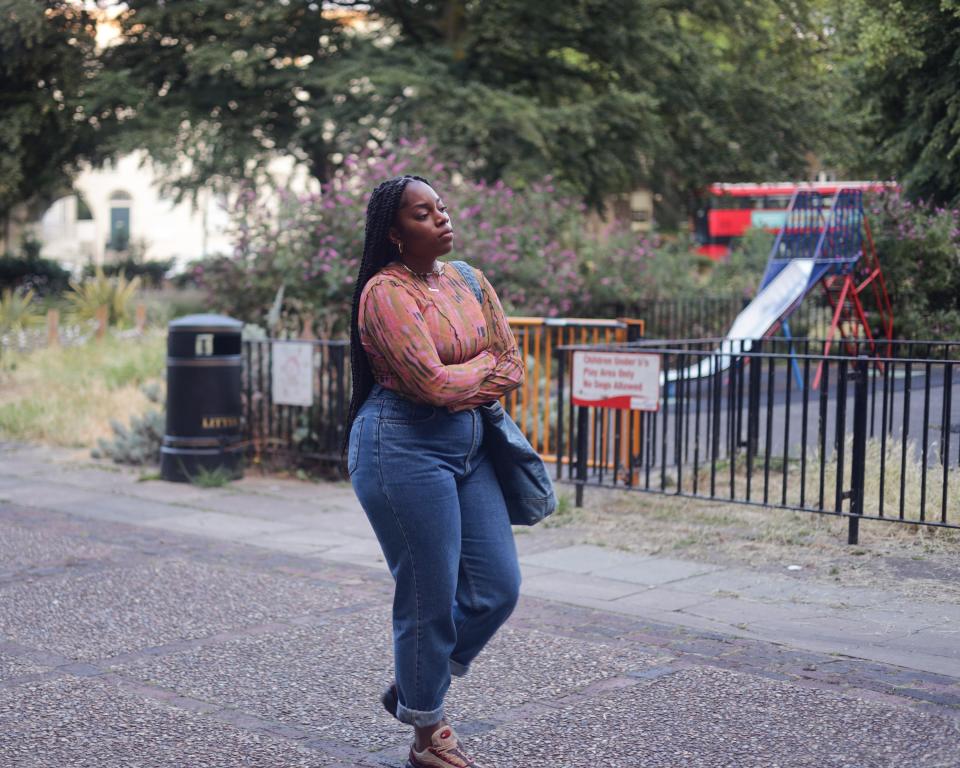
She’s Royal
TV: I love that answer. Okay, last question, I want to hear from each of you: Who is this story, this character, this show — who is Queenie for?
DB: The girls. The guys, and the gentle-girls.
CCW: That's it, no? I've spent so much time with it, that I'm like, "Anyone can watch it, and anyone can take what they can from it." …It could be anyone, and it can be anyone from any place. I've just spent a week in South Africa with hundreds of people being like, "I loved Queenie so much. She is frustrating, but she's amazing." And that was really, really bonkers to me. It's for anyone who has stuff. Queenie's got a lot of stuff, everyone's got stuff… you might watch it, and you might realize that you're not alone in it.
B: I also think it's for everyone, but I'm excited for Black women to watch another Black woman fall apart on screen and feel comforted that it's not just you. We're all messy, we're all a little bit shady, we're all…
DB: Human.
B: Yeah. We're human. And I'm really excited for Black women to be like, "Yes! No! Don't do that! Aah!"
TV: The way I was screaming at my screen?
B: Yeah, exactly.
All 8 episodes of Queenie are now streaming on Hulu in the U.S., Disney+ in the U.K., and Star+ in Latin America.
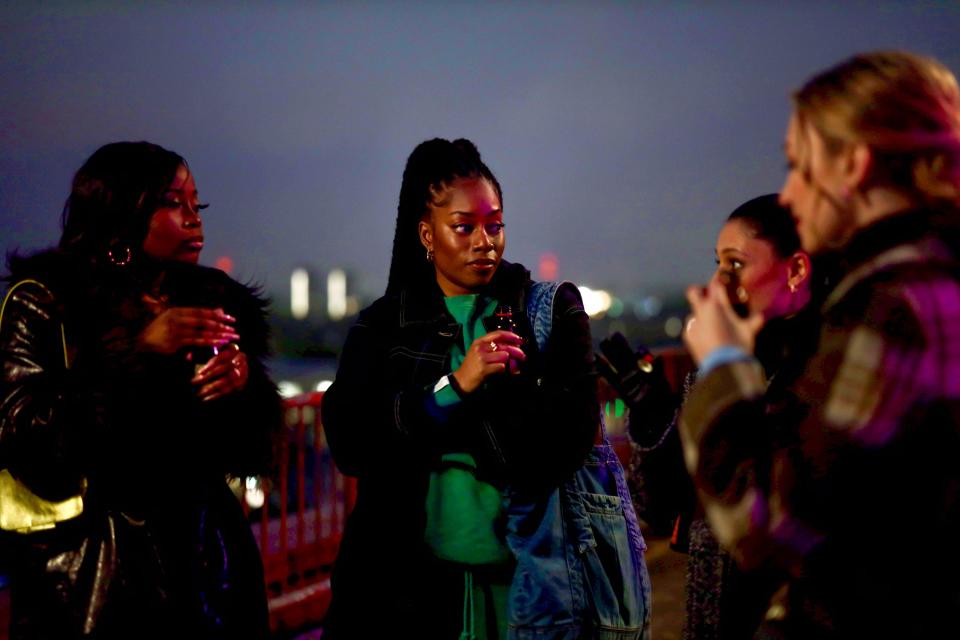
From Virgin to Vixen
Originally Appeared on Teen Vogue
Want more great Culture stories from Teen Vogue? Check these out:
A New Generation of Pretty Little Liars Takes on the Horrors of Being a Teenage Girl
Underneath Chappell Roan’s Hannah Montana Wig? A Pop Star for the Ages
Donald Glover’s Swarm Is Another Piece of Fandom Media That Dehumanizes Black Women
On Velma, Mindy Kaling, and Whether Brown Girls Can Ever Like Ourselves on TV
Gaten Matarazzo Talks Spoilers, Dustin Henderson, and Growing Up on Stranger Things
How K-pop Stars Are Leading Mental Health Conversations for AAPI People and Beyond
Meet the Collective of Philly TikTokers Making You Shake Your Hips
The Midnight Club Star Ruth Codd Isn’t Defined By Her Disability


